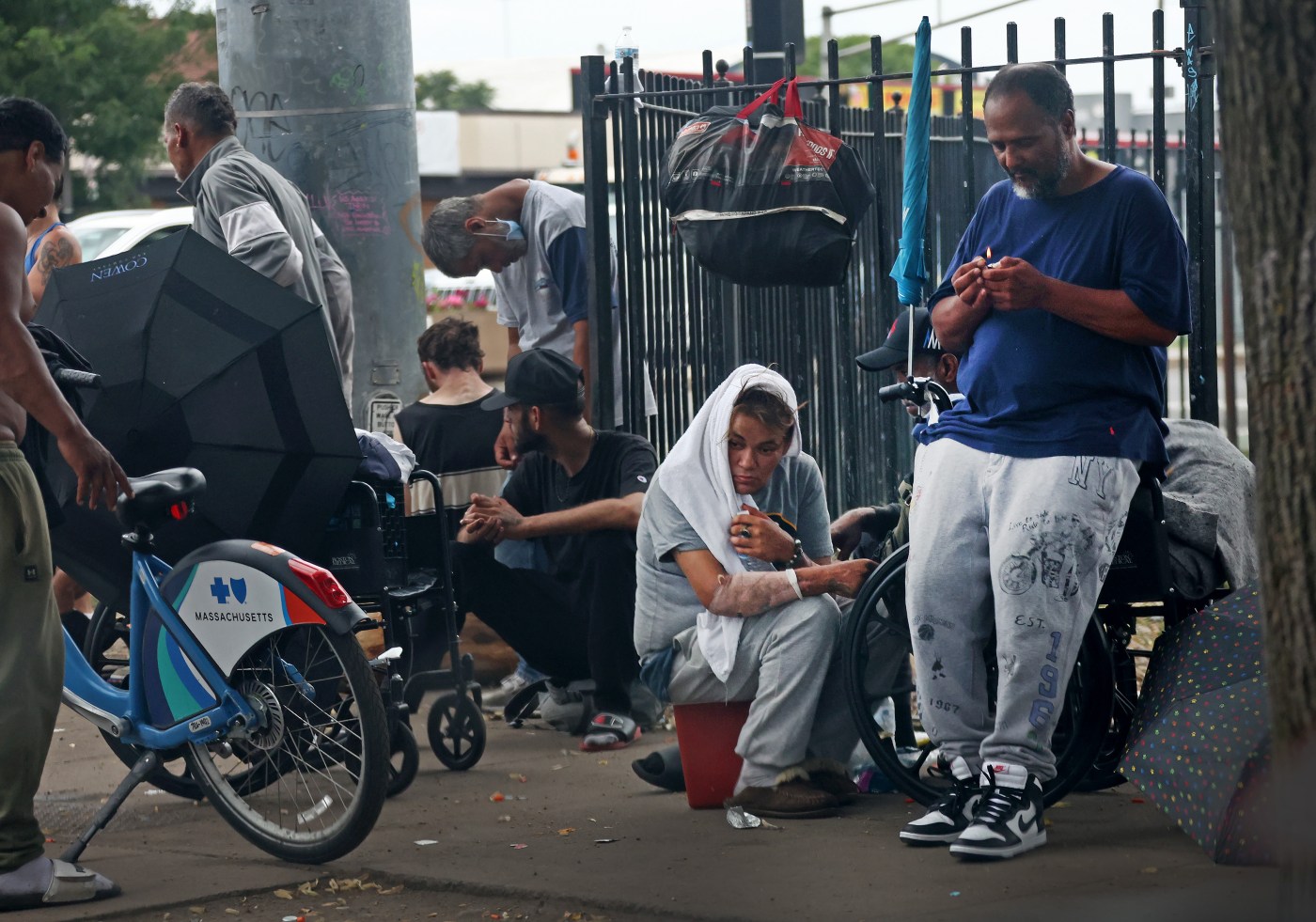
Boston eying new plan to tackle revived Mass and Cass drug market: ‘We’re in a very tough spot’
Discussions are underway in Boston over how to tackle the worsening situation at the Mass and Cass open-air drug market, which returned in full force this summer and evolved by spilling over more frequently into surrounding neighborhoods.
A trio of elected officials who represent neighborhoods impacted by Mass and Cass are working with community and business leaders to revive a proposal that would implement an interim recovery campus to help clean up the troubled area by getting the addicts who frequently gather there into round-the-clock treatment.
The facility would serve as a stop-gap solution for the problem until the city rebuilds a bridge out to a 35-acre recovery campus on Long Island, which could take at least another five years, officials told the Herald.
“We’re in a very tough spot right now,” said state Rep. John Moran, who represents the South End and is among those pushing the plan. “I’m not going to sugarcoat it. We are in a spot where we have more and more usage on a daily basis.”
The crowds are down compared to last summer and the tents are gone due to a new city ordinance that was implemented last fall, but the problem is arguably “worse” this year, in terms of the illegal drug use, crime and filth spreading deeper into surrounding neighborhoods, Moran said. He got a call from a resident Thursday, for example, who was complaining about human feces in their backyard, he said.
“The residents are fed up,” said Boston City Councilor John FitzGerald, whose district includes Dorchester and the South End. “I know if I was living with that around me with my children, I would be apoplectic.”
Moran, FitzGerald and state Sen. Liz Miranda of Roxbury have been meeting with the Wu administration about moving forward with an interim recovery campus, and the mayor’s team has been receptive so far, Moran and FitzGerald said.
“I can’t speak for them in terms of whether we’ll be successful in selling ‘Recover Boston,’ but I can confirm that we’ve been offered a chance to present it, and that’s a step in the right direction,” Moran said.
Sue Sullivan, executive director of the Newmarket Business Improvement District, which represents businesses in the Mass and Cass area and introduced a similar recovery campus plan last year for Widett Circle that was shelved, in part, over complications around the MBTA’s purchase of the land, is compiling a list of potential new locations for the facility.
She declined to share the exact locations, but said she is eying places that are located away from Mass and Cass, where a roughly six-story building already exists that could be retrofitted to accommodate a range of different services around mental health, detox and treatment on each floor.
“We are committed to no new services at Newmarket,” Sullivan said. “We don’t believe you should have everyone all in one place, and I also don’t think it’s a good idea to have a recovery campus where drug dealers can be sitting outside the front door. So we’re looking all over, but it would not be my preference to have it in this immediate area.”
While the businesses at Newmarket have remained resilient and mostly successful over the 10-plus years the situation at Mass and Cass has festered, the scenes of daily drug use, crime and human suffering outside their shop windows impacts the owners’ livelihood and can be hard to stomach, Sullivan said.
She is aiming to keep the recovery campus project in the $10 million ballpark range with a combination of government and private funding that could be up and running in six to eight months, which is what she said the cost estimate and timeline for the Widett Circle plan was.
As for Widett Circle itself, that location is effectively off the table, Moran said.
“We just need to find the right place where we start to direct some of these folks so that they can get services and they get out of the open-air drug market that is Mass and Cass at the moment,” FitzGerald said.
“It’s a way to disrupt the comfortableness that I think some of the folks that hang down there have started to feel,” he said, “so folks don’t feel as inclined to hang there, buy their drugs there, and use their drugs all in one spot.”
Sullivan and three electeds plan to present their proposal to the Wu administration at a community meeting tentatively scheduled for early August. Sullivan reports being optimistic, saying that the city has been “cautiously listening” to their idea. She also cited Newmarket’s past advocacy that got former Mayor Marty Walsh moving on efforts to rebuild the Long Island bridge out to a recovery campus.
The proposal is one of several options that are being considered by the Wu administration as it seeks to either introduce a new plan, or tweak the existing one Mayor Michelle Wu put forward last summer to tackle crime and homelessness in the area, which successfully cleared out the tents but hasn’t kept the crowds and drug activity away, according to Moran and FitzGerald.
Both stopped short of calling the mayor’s plan a “failure,” however, which is how City Councilor Ed Flynn, who represents South Boston and is pushing for a city crackdown in the area, described it on Wednesday when calling for a new plan.
“I think what we see now is we need to do more,” FitzGerald said. “The conversation so far with the mayor and her team has been positive and I think she is open to looking at more of an impactful approach.”
Related Articles
Boston’s Charlestown neighborhood gets public pool back after two-year wait
Boston Mayor Wu’s plan to increase commercial tax rates advances in Legislature
As crowds and drug use return, Boston city councilor says Mass and Cass approach has been a ‘failure’ and needs to be reevaluated
As mayor pitches higher business taxes, analysis shows Boston favors homeowners at among highest rates in the country
Mayor tours summer gardening program and outdoor classroom with Boston students
The mayor’s office did not not elaborate on future plans to address the situation at Mass and Cass, but defended the current approach by sharing statistics that show crime, drug-related arrests and crowding are down this summer compared to last year.
“Since taking action to successfully shut down the permanent encampment and expand services, city departments have continued to partner with community organizations, neighborhood groups, and elected officials to address the varying challenges that emerge each season,” a Wu spokesperson said in a statement.
“During the height of summer, we have been implementing plans focused on curtailing outdoor substance use, connecting unsheltered individuals to housing and recovery services, and ensuring that residential areas are clean and safe.”
Of the recovery campus proposal, the Wu spokesperson said, “The City continues to work closely with community leaders and elected officials to meet our goals for housing and recovery services, and enhance public safety and quality of life for the surrounding neighborhoods.”
Boston, MA – The scene along Melnea Cass Blvd also know as Mass and Cass. (Nancy Lane/Boston Herald)
Boston, MA – The scene along Melnea Cass Blvd also know as Mass and Cass. (Nancy Lane/Boston Herald)
Boston, MA – The scene along Melnea Cass Blvd also know as Mass and Cass. (Nancy Lane/Boston Herald)
Boston, MA – The scene along Melnea Cass Blvd also know as Mass and Cass. (Nancy Lane/Boston Herald)

